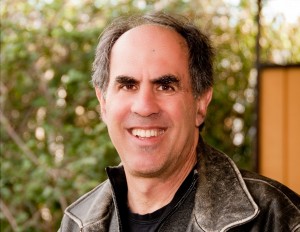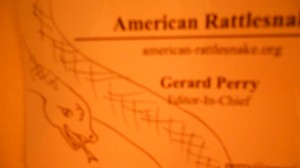It’s been over a year since we lost Andrew Breitbart, although it seems much longer, and his departure is just as piercing today, as we confront an administration unencumbered by the rule of law, overseen by a politically neutered Congress, and whose actions are facilitated by a press whose slavish devotion to the left’s ideological agenda is something you would expect to find in the former Soviet Union. I don’t think we can exaggerate the importance of the space he occupied within the counterrevolutionary movement against the domestic left, and particularly, its allies among the mainstream media. Sitting through a screening of Hating Breitbart, a remarkable film directed by Andrew Marcus which examines why his enemies hated him-and went to such great lengths to misrepresent, vilify or simply ignore his message-reminded me yet again of what a groundbreaking figure he was in disseminating news and information that had been suppressed by what Jim Lehrer nostalgically calls America’s “gatekeepers.”
The beauty of this documentary is that it captures the essence of Andrew Breitbart both as the public face of an online samizdat as well as the individual whose unique personality and character shaped the movement which arrived at an historical moment when-as Andrew Klaven observes-quantum leaps of technology had made the stranglehold the fourth estate exercised over the distribution of information increasingly obsolescent. This is one of the recurring themes of Hating Breitbart, whose interview subjects accurately diagnose the dilemma facing a mainstream media which has consistently failed to adapt to the challenges imposed by progress. In this regard, the campaign to destroy Andrew Breitbart’s reputation made practical sense not only because he offered an alternative form of news gathering and media consumption, but a wholly different business model.
Nothing illustrates the threat this new form of investigative reporting posed to the existing model of journalism more vividly than the mainstream media’s reaction to the 2009 sting conducted by Hannah Giles and James O’Keefe, which uncovered ACORN employees colluding with putative criminals in order to exploit the American taxpayer. True to form, the paper of record didn’t deign to print anything about these potentially criminal activities, even after the organization itself had been defunded by a bipartisan majority in Congress. A multimillion dollar organization that was a mainstay of the post-McGovern Democratic Party, which had generated the shock troops of the activist left, and whom the sitting President had once served as counsel to, was forced to disband. The fact that this galvanic political event went officially unnoticed by this country’s media barons demonstrated beyond dispute that their newspapers and television networks had no interest in uncovering the truth, or even distributing high quality news or information if it didn’t gibe with their sacred cows.
The ferocity with which these entities attacked the reputation of Andrew Breitbart, and to a lesser extent, James O’Keefe, reflected not only their alienation from any ideas that did not come from the Columbia School of Journalism, but their recognition that a new form of journalism was rendering their filters-and by extension, their credentials-null. The backlash against Breitbart, and the concept of citizen journalism itself, was a reactionary gambit by institutions which had invested their reputations in preserving a decaying edifice. A reflexive instinct similar to the MPAA’s attempt to suffocate online speech through proposed laws like SOPA and the Protect IP Act.
The struggle between the bastions of big journalism and Andrew Breitbart over the nature of the ACORN revelations constitutes one third of Hating Breitbart, the remainder of the documentary devoted to an examining a subject, i.e. the framing mechanisms the media uses with regard to race, which I think is by far the most important part of this film.
Many people have accused Andrew Breitbart of being a provocateur; someone who stoked outrage simply for the sake of professional advancement and personal aggrandizement. The idea that his actions and demeanor served as a facade used to generate publicity is superficially appealing, because he was-unlike so many conservatives-brilliant at marketing and keenly aware of how important it was to disseminating your product, which in his case was the message that the left and its instruments in the media industrial complex were engaged in the big lie. However, Bretbart’s outrage wasn’t artificial, it was born of genuine passion for truth and anger at those who have dedicated all of their energies to suppressing it.
His response to the premeditated media smear campaign against the Tea Party prior to the 2010 elections is a perfect example of this-genuinely felt-righteous indignation. For those who don’t recall the circumstances of this controversy-in fact, extensive slanderous/libelous campaign based upon an elaborately crafted myth-it began with charges by a group of bottom-feeders from the Congressional Black Caucus-led by nepotism beneficiary Andre Carson-that they were bombarded with racial epithets as they ostentatiously paraded by a group of anti-Obamacare protestors along the steps of the U.S. Capitol. The genesis of this media creation was a demonstration against a singularly unpopular and unsustainable public policy attended by thousands of individuals from states and cities across the nation. Instead of covering the mass opposition to this plan among the people it was to be forced upon-or examining how it was conceived-the national press corps decided to use the opportunity to defame a group of its political antagonists who threatened Barack Obama’s signature political achievement.
Andrew Breitbart spent months refuting these charges, which were not supported by any contemporaneous accounts from people who didn’t have a vested interest in maintaining this fiction-and which were leveled by people who routinely manipulated the subject of race to engage in political burlesque-because he was incensed by an injustice. He was outraged that the mainstream media would impugn the integrity of millions of Americans simply to shape a narrative that dovetailed with the political ambitions of the current administration. Rather than talk about the vision of a national, grassroots movement which was lobbying for liberty-rather than simply spoils for a particular race, guild, or corporate interest-he spent the better part of 2010 debunking the regurgitated lies of cretinous flunkies like Terry Moran and Tommy Christopher. The reason he did so is because he was genuinely enraged by the lies-and what they implied-and believed that the American public needed to know who was lying to them and why they were doing so.
This is a part of Andrew Breitbart’s composition that I wish more of his admirers would seek to emulate. You hear conservatives condemn or lament the litany of abuses by the left and its accomplices in the media time and again, but rarely do they grasp the immorality of these deceptions, let alone point it out to the broader American pubic. The depth of Breitbart’s fury was commensurate with the outrageousness of the lie we were being asked to accept. Namely, that an organic, nationwide movement to roll back government encroachments upon our freedom of choice was simply some sort of paroxysm of racist tourette’s on the political stage. The insidiousness of this story-line is something that should have generated more righteous anger, even among people who have become inured to the media’s factory line of disinformation.
The third and final part of Hating Breitbart, which examines the Shirley Sherrod controversy-wherein he was personally vilified-is arguably the most critical aspect of this documentary, because it provides us with the sharpest demarcation in philosophy between Breitbart and his enemies. While the former believed in equality of opportunity and the basic principles of the Constitution-at its most fundamental core, free will and voluntary exchange-the latter, including Ben Jealous and the husband of Mrs. Sherrod, desire a spoils-based society that takes the cult of multiculturalism as its starting point.
Breitbart was an exponent of individual rights, not the group rights that Julian Bond, Ben Jealous, et. al. seek to impose as the dominant mode of political discourse in this country. The dangers of embracing this mentality do not consist merely of defrauding the American taxpayer, or even distorting history, but of causing permanent damage to future generations. Prominent conservative blogger Dan Riehl explains just why this reliance upon racial categorization and definition is so corrosive in a welfare state, not only to the body politic, but even-perhaps especially so-to the intended beneficiaries of this racial spoils system. If government benefits are entitlements, then any attempt to curb these payments-or critique the system under which they are distributed-is a personal attack. And when you’re classified according to your ethnicity or race, it is by definition a racist assault.
This is one of the invaluable insights of Hating Breitbart, and one of the many reasons you should see this film. Have it screened in your city. Follow the Hating Breitbart Facebook page, and follow the film’s Twitter page. You need to see and hear Andrew Breitbart for yourself in order to discover why he was such a visionary leader, and why he was so irreplaceable to the conservative moment and the new media. Congratulations to Andrew Marcus, Evan Coyne Maloney, Maura Flynn, Katie O’Malley and everyone responsible for putting this story together. It’s one that needed to be told, and needs to be remembered.









If I knew you went to see the film I would definitely joined you…
It was standing room only. There were two theaters for about fifty people I think. I had to crouch in the aisle for about a half-hour. I found out about it because a friend worked on the film.
This is a film that should be in everyone’s library
Indeed.